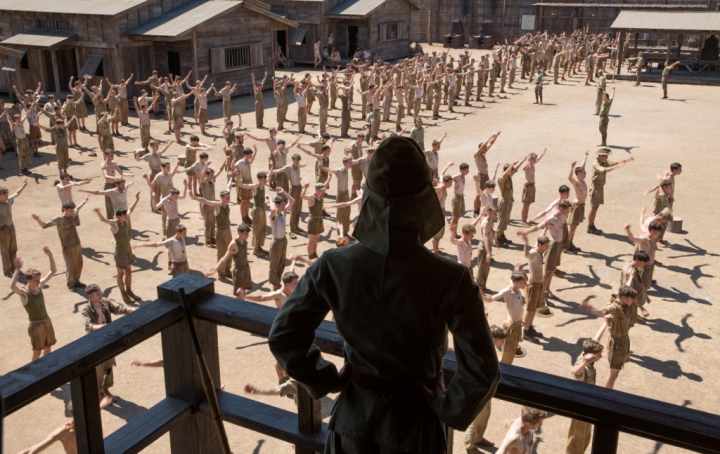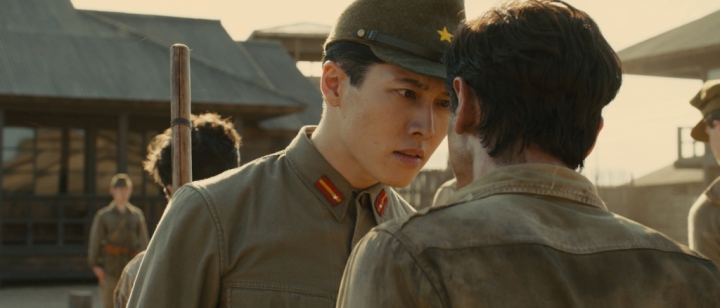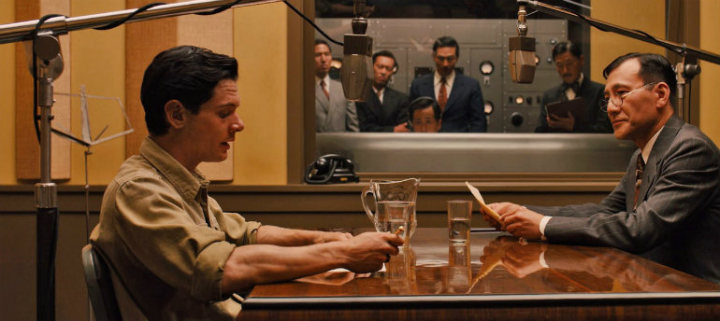Unbroken is quite probably the safest movie you’ll see all awards season. It is calculated to offend no one, even while reveling in sadism and masochism (PG-13 style). It ticks every Oscar-bait, audience-pandering, prestige-picture box on the list, and follows this with insisting that the movie is as important as its subject — to criticize it is to criticize a great American hero. This is not new, of course, but Unbroken ups the ante by boldly announcing, “This is a true story,” at the film’s opening. You have to sit all the way through the ending credits to read the fine print saying, “While this picture is based upon a true story, some of the characters have been composited or invented, and a number of incidents fictionalized,” which almost no one will see and is strictly there for legal reasons. So, this is a true story — more or less.
Still, Angelina Jolie has made a slick, professional piece of work and — in part because of its subject matter — one likely to be loved by a lot of people. What she has not made is a distinctive one. Nothing about Unbroken suggests that it qualifies as “an Angelina Jolie film.” If I saw it without knowing it was hers, I might as easily think it was made by Clint Eastwood or Ron Howard or Robert Zemeckis (in serious mode) or, indeed, just about any Hollywood professional out there. What’s wrong with this? Well, nothing — except the movie has no real identity and feels like it was made by a committee. I realize this doesn’t matter to a large portion of the audience — at least consciously. But if you come away from Unbroken feeling less than fulfilled, this may be why.
The film tells the story of Louis Zamperini (Jack O’Connell) — at least up through WWII, with the next 60-plus years given over to the inevitable series of “rest of the story” on-screen titles. The story is remarkable, the execution less so. Despite a screenplay by (among others) the Coen brothers, Unbroken is a basic biopic. Its only concession to being more lies in its use of flashbacks to break up the narrative, but even these are fairly traditional. The film gives us Zamperini’s story from fleet-footed juvenile delinquent to track star to Olympic star to WWII, when his bomber crashes in the ocean, leaving him and two other survivors adrift in a life raft for 47 days — before two of them are “rescued” by the Japanese. From there it mostly consists — with time out to tempt him to defect — of Zamperini being tortured by a sadistic prison commandant known as “The Bird” (Miyavi) until the war ends.
The crux of all this — aside from the muted homoerotic aspect of The Bird’s obsession with Zamperini — is that Zamperini, as the title already tells us, will remain unbroken by all this. The problem is that the film doesn’t really seem to know how to tell us what makes him survive, except through carefully seeded bromides like “a moment of pain is worth a lifetime of glory” and some safely vague nods to his growing spirituality. What the film mostly offers instead is a series of endless — and ultimately numbing — tortures, culminating in some heavy-handed Christ imagery (see the poster). Is it well made? Yes, it is. In fact, the opening sequence is a stunner, but, unfortunately, nothing afterwards lives up to that. Is it well-intentioned and heartfelt? Probably so. Is it well acted? Undeniably, but if you really want to see what Jack O’Connell can do, check out David Mackenzie’s Starred Up (2014). Is it intensely moving? Now it gets tricky. I’m sure many will find it so. To me, it’s missing something. I almost think it drowns in its own competence. If Unbroken had ever taken a risk, it could have been more than it is. As it stands, The Railway Man from earlier this year deals with similar — also fact-based — material much more effectively. Rated PG-13 for war violence including intense sequences of brutality and for brief language.








The title should be “Its Been Done” or “Every Inspirational POW Movie You’ve Seen”.
It’s a double album of Life raft Greatest Hits and POW Greatest Hits…with some Sports movie Greatest Hits bonus tracks.
All it needs is a scire by Vangelis and this……https://m.youtube.com/watch?v=8sljSf7KVlQ
Who needs Vangelis when you’ve got a song by Coldplay?
It is calculated to offend no one
Exactly why I don’t understand the backlash it’s receiving in Japan. The “rest of the story” on-screen titles paint everyone except “The Bird” as decent people capable of humanity.
You’re assuming the backlash is coming from people who stuck around to read those titles.
…when in reality it’s coming from people who haven’t even seen the movie.
There has been a degree of wailing and teeth gnashing on Facebook over me not being convulsed with loathing over Annie — all of it from people who haven’t seen the film.
geez, sounds like a consistent bias against an uplifting, stay-the-course script.
Hollywood reviewers have us believing every story must complicated, conflicted and conspirational.
Life ain’t always complicated…heros can emerge without the salacious baggage you expect.
Movies are about escapism…sometimes we need a wholesome, uplifting story — sorry reviewers!
A bias against a phony uplifting “stay-the-course” script perhaps. I don’t think, however, that anyone was asking for “salacious baggage.” Then again , how do you equate a movie that claims to be “a true story” with the idea that “movies are about escapism?”
Seriously? A movie made by a committee? Your critique is not only unduly harsh but way off base. For most of those who have seen and liked the movie, it strikes many emotional cords. This movie was moving and captivating, capturing the brutality of war. This is what war was like and captures the essence of the book quite well. The reason you are only a critic is that you would not be able to create such an emotionally riveting movie yourself.
So you were in a Japanese prisoner of war camp? Just asking.
” The reason you are only a critic is that you would not be able to create such an emotionally riveting movie yourself.”
I often disagree with critics. Especially when I feel a kinship with a film as you seem to feel here. What we must remember is that your reaction to the film is based on your connection to the story, your emotional response. Ken’s reaction is that of a man who is being hired to look at a thing critically. His review is rarely a purely emotional response (though that is part of it) , but rather the response of one who has been evaluating films for years. Because a critic doesn’t love a film should have no bearing on your response to it. And if you ever want to make a point, even if you are offended, don’t get personal as you did in the opening sentence of this response. It only serves to reflect badly on you.